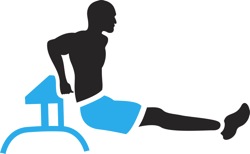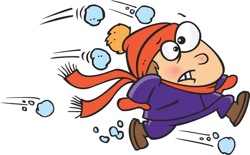Walking Not Talking
 I was out walking yesterday and had a lots of conversation going on in my head. I noticed that I was paying more attention to my thinking than I was to my walk. It was then that The Grasshopper popped in and said, “You’re always feeling but you’re less likely to notice it if you’re thinking.”
I was out walking yesterday and had a lots of conversation going on in my head. I noticed that I was paying more attention to my thinking than I was to my walk. It was then that The Grasshopper popped in and said, “You’re always feeling but you’re less likely to notice it if you’re thinking.”
The feeling apparatus goes on ’round the clock, non-stop for our entire lives. Thinking can be suspended when we focus on the sensations our body is feeling.
Feeling sensations is being in the moment; thinking takes us away from the moment.
Getting out of our head and into our body is one of the most therapeutic things we can do for ourselves on a daily basis. Reminds me of a story . . .
Years ago we had a gathering at our home and the topic of exercise came up between two of the guests. One of the men was in terrific physical shape and the other wasn’t. The out of shape man said, “I tried some arm shaping exercises but didn’t see a lot of results.” The in-shape guy said, “Show me what you did.” The man put two kitchen chairs about 2 1/2 feet apart and placed his hands on the seat portion of the chairs and began to do some dips to work his triceps. He was going through the exercise as though there was a timetable and he had to do a certain amount of dips in a certain amount of time.
The in-shape man said it wasn’t the exercise that was at fault; it was the way he was approaching it. He then demonstrated how the out of shape man did the exercise and then he showed him how he would do it. He did the exercise much more slowly, but he said the secret was to feel the muscles being worked. He said, “Give your attention to the muscle being worked rather than rush through the routine without attention.”
There was a noticeable difference from when he just went through the moves to when he gave attention to the muscle being worked. It’s safe to say he was focused on the sensations his body was feeling.
This isn’t a treatise on exercise; it’s more about how thinking keeps you from feeling and how it takes you away from the moment and how ineffective that is.
The gift I got yesterday was that I noticed I was in my head when I needed to be in my body. After that realization, the rest of the walk had a lot less talk.
All the best,
John
VIRTUAL MASSAGEBe Sociable, Share!

 I dare say it’s one of the biggest copouts of all time – “I don’t care.” It’s often a protection mechanism used to deny being emotionally hurt by another’s actions. It’s also a repellent.
I dare say it’s one of the biggest copouts of all time – “I don’t care.” It’s often a protection mechanism used to deny being emotionally hurt by another’s actions. It’s also a repellent. I’m always quite hesitant to ask a “Why” question, but it seems to fit here. Why do we do what we do?
I’m always quite hesitant to ask a “Why” question, but it seems to fit here. Why do we do what we do? The Grasshopper offered up a tidbit in the wee hours this morning: “You’re all alone in your comfort zone.”
The Grasshopper offered up a tidbit in the wee hours this morning: “You’re all alone in your comfort zone.” I have a new criterion for voting – Sanctimony. The dictionary tells me that means morally superior.
I have a new criterion for voting – Sanctimony. The dictionary tells me that means morally superior. Everyone struggles with something. It doesn’t matter who you are or what your station is in life. If you’re human, you struggle.
Everyone struggles with something. It doesn’t matter who you are or what your station is in life. If you’re human, you struggle. Aside from being an improper use of the English language, “Who is I?” is a question we rarely ask. We often have that existential moment when we ask, “Who am I?” but that question doesn’t provide a satisfying answer from our conscious mind.
Aside from being an improper use of the English language, “Who is I?” is a question we rarely ask. We often have that existential moment when we ask, “Who am I?” but that question doesn’t provide a satisfying answer from our conscious mind. Thoughts that make you stand up and take notice come at the oddest times. Who carries a pen or pencil into the bathroom? “Have you no respect, Grasshopper?”
Thoughts that make you stand up and take notice come at the oddest times. Who carries a pen or pencil into the bathroom? “Have you no respect, Grasshopper?” I woke up with the word, “Succinct” on my mind.
I woke up with the word, “Succinct” on my mind. “When you defend yourself too often, it’s offensive,” so said The Grasshopper yesterday.
“When you defend yourself too often, it’s offensive,” so said The Grasshopper yesterday.